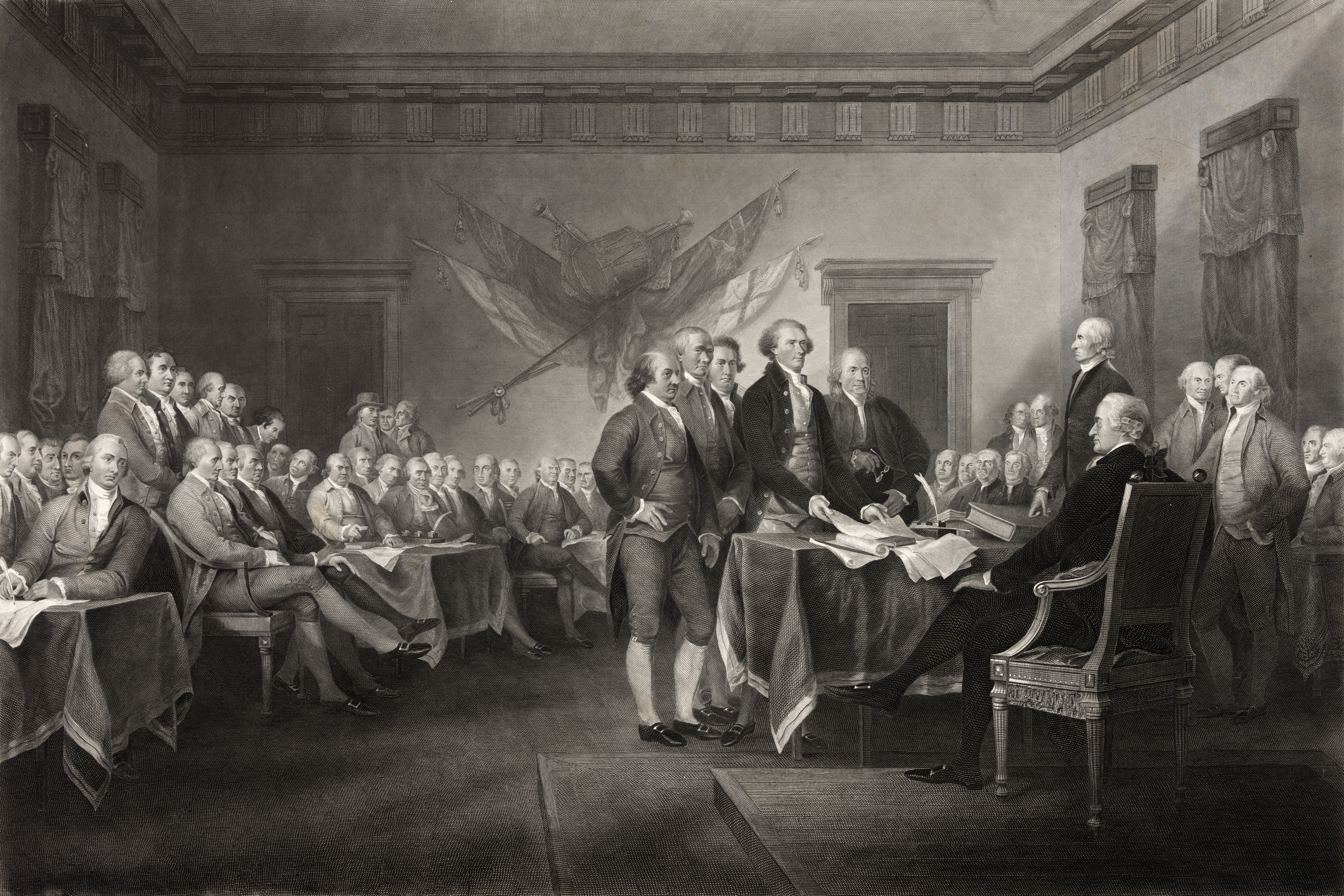Nationalism in the abstract can’t defend our unique constitutional traditions.
National Conservatism vs. American Conservatism

Not all nationalisms are created equal.
What follows is an excerpt from Charles R. Kesler’s longer essay, “National Conservatism vs. American Conservatism,” from the Winter 2023/4 issue of the Claremont Review of Books. Responses will follow.
What goes by the name of “National Conservatism” is perhaps the most visible, identifiable, and successful part of the New Right. It overlaps with the MAGA conservatives, but not every National Conservative thinks former president Donald Trump is so great or even knows greatness when he sees it. It should also be admitted that there are circles of the current New Right who doubt that America herself is or ever has been great, or could be made great “again.” These radical doubts come from two contrary directions: from Catholic “integralists” who bemoan America’s secularism, materialism, and individualism, which they sometimes allege to be necessary legacies of the country’s founding; and from pseudo-Nietzschean critics who blame Christianity and bourgeois morality for America’s purported ignobility and lack of manliness. These critics are not mainstream National Conservatives if they are Natcons at all. Though influential, their circles seem small enough to neglect for the purposes of this essay, which is interested in the relation between official or organized National Conservatism and the older American conservatism—rooted in American constitutionalism—at its best or most inspiring.
The political scientist Martin Diamond used to say that the oldest word in American politics is “new.” It ought not surprise, then, that today’s New Right is not the first, nor likely the last, that America will experience. The first proper or self-conscious modern conservative movement was the brainchild of William F. Buckley, Jr., among others, in the 1950s, and cast its first presidential votes for Barry Goldwater in the Republican primaries of 1960 and the election of 1964. Yet even that founding generation of American conservatives sometimes called itself the “New Right,” in contradistinction to the “Old Right,” whose anti-statist domestic policy had been crushed by Franklin D. Roosevelt in the “Revolution of 1932” (as Willmoore Kendall and Frank Meyer christened it) and whose non-interventionist foreign policy had been sunk by the Japanese at Pearl Harbor. Yet the presence of other novel experiments in post-New Deal conservative thought, now largely forgotten, soon induced Buckley and his allies to begin referring to themselves also as “movement conservatives” and even “radical conservatives.” The point was to emphasize they were outside of and opposed to the reigning establishments—not only the liberal establishment but also the “well-fed Right,” in Buckley’s words, the regrettable allies of the northeastern (read: liberal) Republican establishment.
In fact, these two New Rights have many things in common, though no one would ever mistake Donald Trump for Bill Buckley, and neither today’s MAGA youth nor the editors of today’s National Review would regard any political resemblance as a compliment. Nonetheless, both movements were populist (a slippery word, admittedly) in spirit, focused on issues of internal loyalty and subversion and fear of American decline, deeply distrustful of the American academy, and confronted by an ideologized Left eager to exploit rapidly changing racial and sexual mores. Perhaps most noticeably, each New Right was impatient with the spiritlessness and excessive “modulation” (Buckley’s word) of the mainstream Republican Party, its typical politicians, big donors, and campaign strategists. These GOP elites reflected a ruling class that didn’t understand, or care to understand, how close America had drawn to the point of political crisis. As today’s young Right started saying some years ago, they didn’t know what time it is. WFB criticized this ruling class as the “Fabian operators…bent on controlling both our major political parties.” Today, the kids condemn what they term the “uniparty.”
Of course, politics doesn’t stand still, and since the early 1960s the Right’s political evolution, or at least the succession of names we apply to ourselves, has proceeded apace: paleoconservatives, neoconservatives, the Religious Right (whether Moral Majority or Christian Coalition), “Reagan’s regiments,” civil society conservatives, leave-us-aloners, national greatness conservatives (Bill Kristol, we hardly knew ye), big government conservatives, compassionate conservatives, Sam’s Club Republicans, Reformocons, Tea Partiers, and many other appellations. American conservatives, by whatever name you call us, seem to suffer from a bad case of not wanting to join any club that will have us as a member—or at any rate, that will have all of us as members.
The varieties of conservative experience tell us something, however, about the range of goods that conservatives seek, and have sought, to conserve: the political good, as recognized by conservatives, is quite heterogeneous. Which is one reason it’s always been easier for us to coalesce around what we are against rather than what we are for, exactly. Besides, different generations experience different threats to different combinations of goods. The Zoomers have never known anything like the Boomers’ experience of the Cold War and Communist expansionism; likewise we Boomers have little sense of how awful it is to grow up choking on the strident ideology and self-loathing culture of today’s schools, or trapped in the global web. Many of the confusions within contemporary conservatism stem from such generation gaps. “Modern formulations are necessary even in defense of very ancient truths,” Bill Buckley advised in the 1960s. “Not because of any alleged anachronisms in the old ideas…but because the idiom of life is always changing, and we need to say things in such a way as to get inside the vibrations of modern life.”
But not all the disagreements on the contemporary Right stem from the search for new idioms, or from understandable differences over means to the same ends. Our New Right charges the old New Right with certain errors, which allegedly cost it victory against the Left when it had the chance. In fact, the cardinal characteristic of our New Right is the almost equal vehemence with which it denounces both woke liberalism and modern conservatism in what it imagines to be its anachronistic Reagan and Buckley mode.
The Natcon Project
To see what is at stake in the debates between these two New Right schools or movements, let us look closely at what the Natcons themselves endorse as their manifesto, the document titled “National Conservatism: A Statement of Principles.” Drafted, according to the document itself, by Will Chamberlain, Christopher DeMuth, Rod Dreher, Yoram Hazony, Daniel McCarthy, Joshua Mitchell, N.S. Lyons, John O’Sullivan, and R.R. Reno “on behalf of the Edmund Burke Foundation,” the statement is copyrighted by that foundation and resides on the website of nationalconservatism.org, a project of the Edmund Burke Foundation, whose offices are in Washington, D.C. Hazony, an Israeli political thinker with a B.A. from Princeton and a Ph.D. from Rutgers, is the foundation’s founding chairman and the movement’s leading thinker and chief convenor. Many friends and old friends have signed this statement and endorsed National Conservatism as essential to the revitalization of American Conservatism. I did not sign it, not so much because of what it said but because of a certain unease over what it did not say. This essay is an elaboration of the reasons for my unease.
In the first place, it is not simply a matter of putting “nationalism” back into conservatism. The principles of our nationalism derive from the founding documents of the republic. For Americans, as the Declaration and countless other public affirmations make clear, the nation itself is or conceives itself to be the result of a choice by individuals, enjoying certain inherent and unalienable rights, to join together as a people for their mutual safety and happiness, and to form a government for themselves to secure those rights and effect those ends. The American people, happily, had those characteristics in common that most nations have or wish to have—in the words of The Federalist, Americans were “descended from the same ancestors, speaking the same language, professing the same religion, attached to the same principles of government, very similar in their manners and customs”—but regarded these as necessary or useful, but certainly not sufficient, conditions for a free and virtuous nation, which must also have a good government capable of securing the common good and protecting natural rights. Most forms of nationalism regard those shared inheritances as the essence of a shared identity and common will, hence not only necessary but sufficient for nationhood. That’s why our nationalism has always been exceptional, featuring more individualism, more pluralism, more freedom, and more statesmanlike deliberation and prudence than is typical. We think of ourselves as a founded nation; most nations don’t think they have or need such a clear, conscious, and principled beginning. President Obama got it exactly wrong, as usual: our exceptionalism is not the same as the Greeks’ or the Brits’.
For most nation-states the state or the constitution is the expression of the nation, but the nation comes first, in theory and usually in practice too. That is, nationalism is the fundamental political phenomenon. For the United States, the emphasis is on the regime or the Constitution and its principles as the fundamental phenomenon that shapes the nation. Thus, for example, among the first questions the founding generation had to face was whether the U.S. was one nation, albeit cast into a partly federal form, or whether it was what Willmoore Kendall liked to call a “baker’s dozen” of independent, sovereign states.
“We emphasize the idea of the nation,” the Statement of Principles explains, “because we see a world of independent nations—each pursuing its own national interests and upholding national traditions that are its own—as the only genuine alternative to universalist ideologies now seeking to impose a homogenizing, locality-destroying imperium over the entire globe.” But that view of nationalism is itself an ideological category, a homogenization. America’s special view of civic or republican nationalism, that is, nationalism limited and shaped by human equality, liberty, and consent, is ignored or downplayed, incautiously mixed with generic nationalism. Though standard-issue nationalism is not always illiberal or oppressive, it can be. What the National Conservatives are actually offering, then, is not so much the return of American nationalism—or of a purely traditional form of American conservatism, shorn of neos and libertarians—but a re-writing of American conservatism along new, less brazenly American lines, assimilating it, in effect, to the nationalism of other nations, beginning with Great Britain. Genuine American nationalism with its laws of nature and of nature’s God and its unalienable rights and its written constitutionalism appears to Hazony and his followers as more like part of the problem than part of the solution.
Having liberated nationalism from some of the moral limitations that the Americans in the best case demanded of it, the Natcons are free to add back new limitations to try to deal with nationalism’s illiberal tendencies. For example, nationalism as they define it is explicitly anti-imperialist, and Hazony in his books traces nationalism back to the children of Israel’s hostility to the Babylonian and Roman empires of their day. “We condemn the imperialism of China, Russia, and other authoritarian powers,” the Natcons declare, “But we also oppose the liberal imperialism of the last generation, which sought to gain power, influence, and wealth by dominating other nations and trying to remake them in its own image.” The difficulty with these general formulas when applied to policy becomes apparent. Take the ongoing conflict between Russia and Ukraine. Is this a case of Russian imperialism trying to swallow its neighbor, or of liberal imperialism (NATO and the E.U.) trying to absorb part of Russia’s legitimate sphere of influence? Or both? In any case, it’s clear that the new emphasis on nationalism does not obviate the dilemmas of old-fashioned prudential statesmanship, the necessity, as George Washington put it succinctly in his Farewell Address, to “choose peace or war, as our interest, guided by justice, shall counsel.”
“We wish to see a world of independent nations,” the statement says early on. But is every nation in the world capable of independence? Equally capable? The Natcons acknowledge the problem, without quite admitting it, in the next sentence: “Each nation capable of self-government [emphasis added] should chart its own course in accordance with its own particular constitutional, linguistic, and religious inheritance.” Yet what exactly qualifies or disqualifies a nation from governing itself? How many peoples lack the right “constitutional, linguistic, and religious inheritance”?
The higher the standards of self-government are raised, the more exclusive a club it becomes. What do the Natcons propose to do with the nations incapable of nationalism—those nations, that is, that are either (a) incapable of self-government or (b) capable of much more than self-government? Many nations have had a tradition of imperialism, after all, from ancient Rome to modern Britain and Russia. Isn’t the root of Russia’s depredations in Ukraine often said to be its, or Vladimir Putin’s, peculiar nationalism? Some nations are so good or, more likely, so bad at self-government that they presume they should govern other nations too. The Natcons are keen to see that each country steer by the light of its own tradition and almost nothing more—as the “only genuine alternative to universalist ideologies.” But what if your nation’s tradition includes a healthy dose of imperialism, or for that matter, universalist ideology?
Read the rest here.
The American Mind presents a range of perspectives. Views are writers’ own and do not necessarily represent those of The Claremont Institute.
The American Mind is a publication of the Claremont Institute, a non-profit 501(c)(3) organization, dedicated to restoring the principles of the American Founding to their rightful, preeminent authority in our national life. Interested in supporting our work? Gifts to the Claremont Institute are tax-deductible.
There’s no escaping the tensions inherent in National Conservatism, and in political life.
At the intersection of politics and principle.



